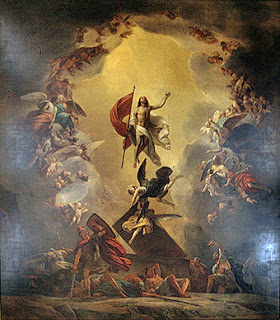 Sent on mission
Sent on mission
If you are expecting to hear an account of the Ascension at the end of today’s gospel passage, you will be sorely disappointed. At the end of St Matthew’s gospel, Jesus does not ascend. This seems utterly ironic as the gospel text chosen for this Solemnity of the Ascension. If you want to hear the story of the Ascension you have to read the First Reading taken from the Acts of the Apostles. But that does not mean that the theme of the ascension is entirely absent from the gospel passage. The significance of the Ascension is seen in the parting words of Jesus, ‘And know that I am with you always; yes, to the end of time.’ In these last words, our Lord promises His enduring presence in the Church while she is on mission.
This is where the story in Acts and the ending of St Matthew’s gospel converge. After the Ascension, the disciples returned to the Upper Room, led back to the place where the Eucharist was instituted and it is here, later in the story, where the Church was founded; the place where these disciples will receive the Paraclete, the Holy Spirit. And it is from here, that the Church begins her mission, her members called to be “witnesses not only in Jerusalem but throughout Judaea and Samaria, and indeed to the ends of the earth.”
The Ascension is not just a graphic description of how Christ is lifted up into the heavens but it is an event which is ultimately tied to the mission of the Church. Christ came to fulfill the mission that was entrusted to Him by His Father, a mission which He had accomplished by dying on the cross and rising from the dead. His death and resurrection had opened up for us the way to heaven. Henceforth, humanity is elevated to an unprecedented dignity, the dignity of participating in the Father’s glory. On account of Christ’s ascension into heaven, we now know that the true reason for our existence - our true destiny as human beings - is God Himself. We were made for Him, to be with Him in heaven for ever.
This same mission of leading all to our heavenly homeland is entrusted by the Lord to the Church, to us. Our mission is to lead others to where our Lord and Master has gone before us. This is what the priest prays in the Collect at the beginning of today’s mass, “where the Head has gone before in glory, the Body is called to follow in hope.”
The Upper Room is not meant to be a secure bunker, shielding the disciples from a cruel, hostile and unforgiving world. It was meant to be a launchpad, a planning board room, a sanctuary of prayer in order to prepare the Church for mission. The last thing that our Lord had intended for His disciples is for them to remain locked down in that room for the rest of their lives, frightened of facing the many risks which comes with proclaiming the Good News to the ends of the earth.
Most of us have been under lockdown since the start of the MCO. Lockdowns are never easy, nor are they comfortable. But I think that many of us have now found much security in our present locked down condition, in the safety of our own homes, unwilling to venture forth. I do not think that anyone, not even the government nor the medical experts had envisaged that we would be locked down forever. Since the start of the MCO, the authorities had been very successful in instilling fear of this coronavirus among us, because fear is a powerful motivation for compliance. But, now that it wishes to reopen the economy and encourage us to return to some form of normalcy, it finds itself unable to undo the fear that has been deeply rooted in our psyche. Fear can cripple us, it can stunt growth, prevent us from moving forward and dull the enthusiasm for mission.
Fear can be a tremendous barrier for mission but fear itself is not a bad thing. Fear tells us where we feel the most vulnerable and provide us with an opportunity to place our trust in God. When you are hapless, when all your resources have been exhausted, when there seems to be no other solution, turning to God in desperation seems to be the last option available to the most hardened of unbelievers. And that is why accepting Christ’s commission to “make disciples of all the nations” cannot be purely predicated on our own ability and resources. Just as our Lord did not choose perfect men to be His disciples and apostles, the Church does not need perfect members to carry out Christ’s mission. This is because grace is needed to build on nature, God’s assistance is needed to complete and perfect human effort and ingenuity. Ultimately, we must rely on the grace of Christ’s enduring presence seen in His promise, “know that I am with you always; yes, to the end of time.”
Seated at the right hand of the Father, our Lord Jesus continues His mission of drawing humanity away from the downward spiral of death and corruption so that they may ascend to a place of life and happiness within the heart of God. Christ, though He has ascended to heaven, continues to act through His Church. He does this through each of us. Therefore, our mission is not driven by our own initiative and efforts. If our efforts are able to bear fruit, it is because Christ is our strength, our motivation and our ability to do what we cannot accomplish on our own.

